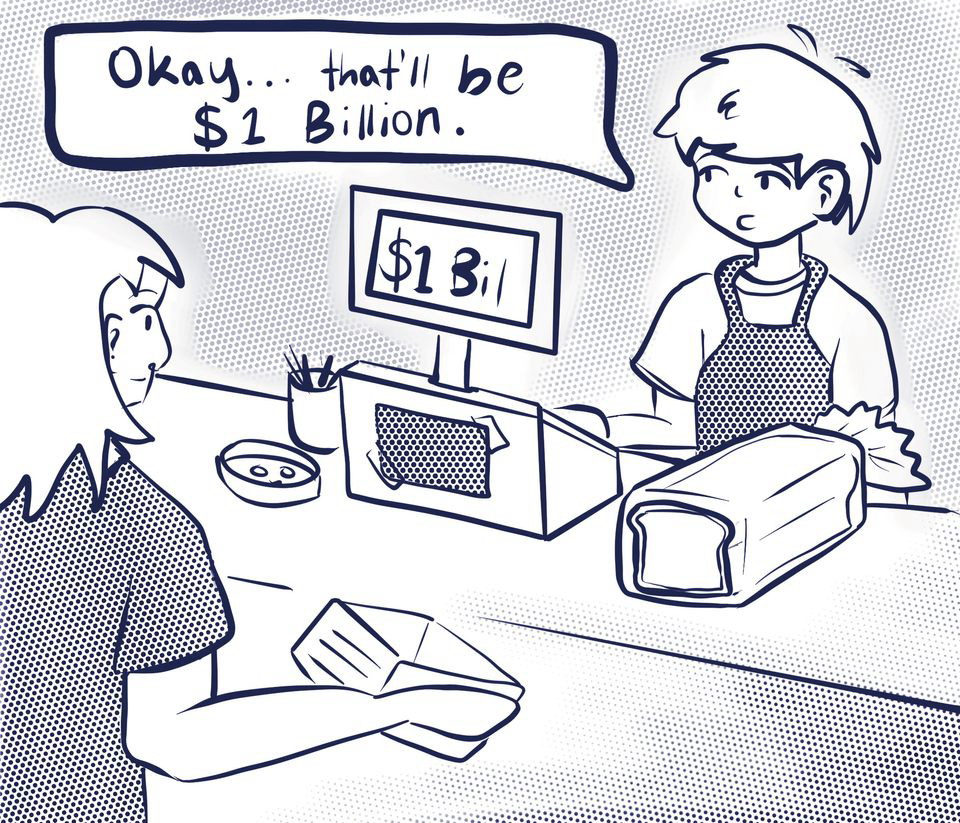Money Motivation: Will there ever be hyperinflation in the US?

In 1918, a loaf of bread in Germany costed 0.6 German marks, by November 1923, the price soared to 201 billion marks. Will this happen here in the U.S.? (ART BY TESS PETERS/THE VISTA)
The United States government continues its attempt to curb inflation levels, which are overwhelming millions of Americans. Since 2020, the Department of the Treasury and Federal Reserve have printed nearly 80% of all U.S. dollars currently in circulation.
For context, COVID-19 created tough times for citizens and governments, forcing many countries to stimulate the economy while the world was shut down. The U.S. had to print money in order to give these stimulus packages for all who needed them. Nations ended up spending trillions on aid packages for their people. In fact, 80% of dollars ever printed in the U.S. was during the pandemic.
After heavy government spending and cash printing, central banks usually increase interest rates. Interest rates help keep the economy healthy when it is overstimulated. Rates reduce consumer spending and fast-rising housing demands while they encourage saving.
So, are we going to end up like Germany after World War I? The German economy was so crushed and inflated in 1923, the price of a U.S. dollar to marks was $1 for every one trillion marks. Fortunately, we will most likely not get to that level of hyperinflation in the states.
Now, the Federal Reserve (Fed) tightened monetary policy by increasing interest rates on loans, in order to combat this new flood of money in circulation. Their goal is to get the inflation rate down to 2% before cutting interest rates.
According to the U.S. Bureau of Labor Statistics in their most recent March 2024 Consumer Price Index report, the price of all goods has gone up 3.5% in 12 months, over a percent higher than the Fed’s ideal 2% goal. The largest price spike has been transportation services like flights, rideshares and subways, increasing by 10.7% since 2023.
Your money sitting in a typical savings account is losing about 3% of its value every year. Most banks only offer about 0.01% to 0.1% interest on their normal savings accounts. With a $10,000 investment, these rates would only earn you about $1-$10 on the year, while your buying power decreases to about $9,709. However, high interest savings accounts can counter rising prices and earn you cash. For example, a high interest savings account with a 5% APY and the initial $10,000 investment will end the year with a buying power of about $10,218, more than a $500 difference. Bankrate.com, a finance company in New York, NY updates their website daily with the best high-interest savings accounts for 2024, only featuring FDIC-approved companies (The Federal Deposit Insurance Corporation protects bank depositors against the loss of their deposit in case the company goes out of business).
Considered the riskier way to hedge inflation, investing can conquer it too if done right. Successful businesses are successful on Wall Street too. The top 500 companies in the U.S. earn about 7% of real returns, usually outpacing inflation every year since 1957. For instance, the S&P500 had a 26% return in 2023. Just like life, companies have their highs and lows, not always going up. Recently in 2022, the S&P500 had a negative return of -18%.
More young people now than ever are worried they will never own a home after graduation because of high interest rates on mortgages. But with proper money management, becoming a homeowner is possible. Many people wait for the ‘right time’ to buy a house when mortgage rates drop. But there may not be a ‘right time.’ As inflation keeps increasing the cost of houses 1-8% every year while your cash could be losing value, it may be cheaper to lock in a fixed mortgage rate (depending on your credit score and other factors). This would protect you from future rate increases.
Acquiring wealth is attainable through a lot of these three: common sense, discipline and research. ‘Money motivation’ is meant to inspire you to get on the right track, but you must always do your own research because everyone is in a different financial position.

